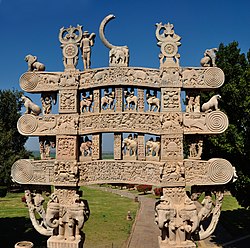Economy
As the government liberalised its economic policies, economic growth surged and the foundation was laid for India becoming one of the fastest growing economies of the world. The former Prime Minister of India, Manmohan Singh was instrumental in bringing about this change although India, with its socialist past, could not push economic reforms as aggressively as China which raced ahead during this decade from being just ahead of India to a GDP double that of India (a 4 times higher rate of growth) due to its more aggressive rate of economic reform. The License Raj, a system perceived as strangling India's economic potential due to over-regulation, came to an end. [4]
GDP per capita nearly doubled from US$1,380 in 1990 to US$2,420 in 2000. This rate of growth was 11th fastest in the world. Foreign direct investment, which contributed less than 0.1% to the GDP came close to contributing 1% to the GDP. Foreign exchange reserves, which had plunged to zero, surged to 50 billion US dollars. Short term external debt which had risen to 350% of foreign exchange reserves plunged to 25% of foreign exchange reserves. Foreign direct investment (mainly from the United States, United Kingdom, Germany and Japan) started to become positive. The Indian rupee plunged from 25:1 to 45:1 compared to the USD. Contribution of services sector to GDP increased rapidly.
Impact on society
The growing Indian economy powered change in society, as India became more globalised, [5] and its sports received greater investment. [6] The famous advertising slogan "Yeh dil maange more" (transl. "This heart demands more") by Pepsi was coined in 1998, expressing the rising hope of the time. [7]
This page is based on this
Wikipedia article Text is available under the
CC BY-SA 4.0 license; additional terms may apply.
Images, videos and audio are available under their respective licenses.
